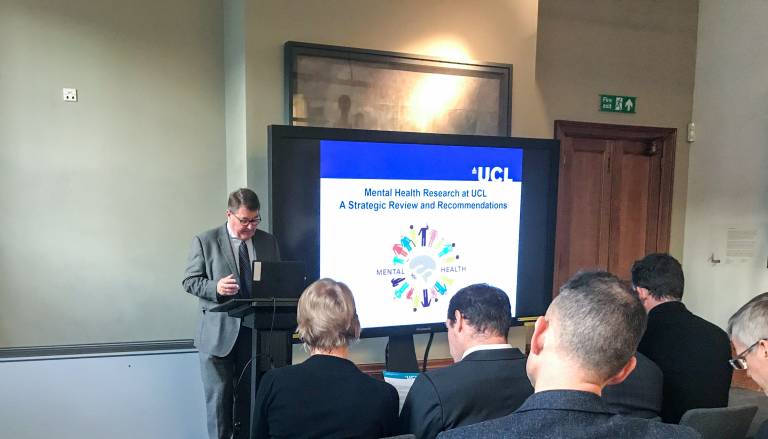UCL announces Mental Health Strategy
18 January 2019
The UCL Mental Health Strategy was formally launched on Friday 11 January 2019.

The Strategy outlines UCL’s vision to realise its potential in mental health research, education and policy, which will benefit individual and public health, healthcare services and society.
The new Strategy will support university-wide collaboration, bringing together world-leading researchers from multiple disciplines including cognitive neuroscience; psychiatry; psychology; population and social sciences; education; digital health; intervention evaluation; and policy translation. UCL will also seek to engage policy-makers, health practitioners, and user groups.
The Strategy was authored by the UCL Mental Health Strategy Working Group, led by Chair Professor Essi Viding and Deputy Chairs Professors Jonathan Roiser and David Osborn.
Launching the new Strategy, Professor Viding, said: “The social and economic impact of mental ill health is vast, yet research into causes and treatment of mental health disorders has been historically underfunded. This is about to change; several policy and funding initiatives are now focusing on mental health.
“The Strategy presents unprecedented opportunities for UCL to make a difference in mental health research, and to lead in providing training for the next generation of mental health practitioners and researchers.
“UCL wants to be at the forefront of conducting research that delivers real improvement in the lives of people with mental illness and their families,” said Professor Viding.
Playing a pivotal role in realising the ambitions set out in the Strategy, will be UCL’s newly developed Institute of Mental Health (IoMH), located in the Faculty of Brain Sciences and led by Director and Sackler Chair Professor Anthony David.
Professor David said that the IoMH will be a catalyst for building up a large group of affiliated members who share a common desire to make a positive impact on mental health. “We want UCL’s high reputation in science and scholarship in the fields of cognitive neuroscience, psychiatry, psychology, and population health to be more commonly appreciated and we want to show the world how interdisciplinary mental health science can make a real difference to society.”
Dean of the Faculty of Brain Sciences, Professor Alan Thompson, who will oversee the implementation of the Strategy, said: “It was great to see the Mental Health Strategy received with such enthusiasm – it promises to shape our future direction and raise our profile. Congratulations to Essi and the team on the delivery of a strategy that is a key priority for UCL.”
Mental health disorders are widespread in the UK population, affect people throughout the life course and cost the UK economy £35bn per year. Almost half of adults in England have had a diagnosable mental health disorder in their lifetime.
Links:
- UCL Mental Health Strategy
- UCL Institute of Mental Health
- Professor Essi Viding
- Professor Jonathan Roiser
- Professor David Osborn
- Professor Alan Thompson
 Close
Close

